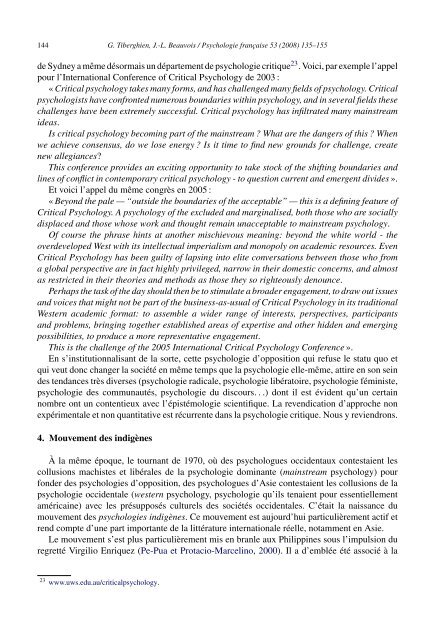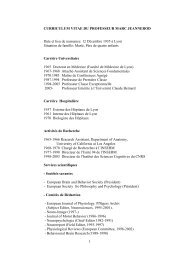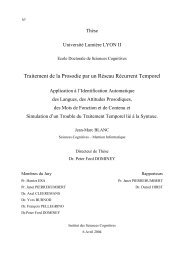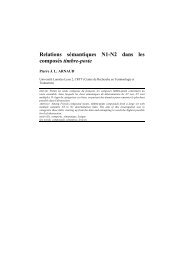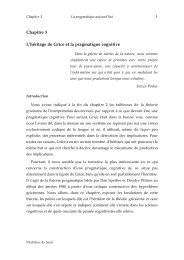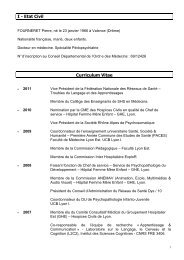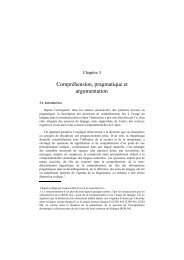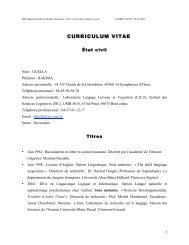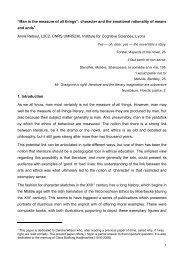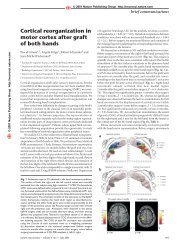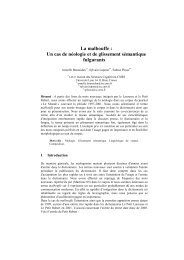Domination et impérialisme en psychologie - Institut des Sciences ...
Domination et impérialisme en psychologie - Institut des Sciences ...
Domination et impérialisme en psychologie - Institut des Sciences ...
You also want an ePaper? Increase the reach of your titles
YUMPU automatically turns print PDFs into web optimized ePapers that Google loves.
144 G. Tiberghi<strong>en</strong>, J.-L. Beauvois / Psychologie française 53 (2008) 135–155de Sydney a même désormais un départem<strong>en</strong>t de <strong>psychologie</strong> critique 23 . Voici, par exemple l’appelpour l’International Confer<strong>en</strong>ce of Critical Psychology de 2003 :« Critical psychology takes many forms, and has chall<strong>en</strong>ged many fields of psychology. Criticalpsychologists have confronted numerous boundaries within psychology, and in several fields thesechall<strong>en</strong>ges have be<strong>en</strong> extremely successful. Critical psychology has infiltrated many mainstreamideas.Is critical psychology becoming part of the mainstream ? What are the dangers of this ? Wh<strong>en</strong>we achieve cons<strong>en</strong>sus, do we lose <strong>en</strong>ergy ? Is it time to find new grounds for chall<strong>en</strong>ge, creat<strong>en</strong>ew allegiances?This confer<strong>en</strong>ce provi<strong>des</strong> an exciting opportunity to take stock of the shifting boundaries andlines of conflict in contemporary critical psychology - to question curr<strong>en</strong>t and emerg<strong>en</strong>t divi<strong>des</strong> ».Et voici l’appel du même congrès <strong>en</strong> 2005 :« Beyond the pale — “outside the boundaries of the acceptable” — this is a defining feature ofCritical Psychology. A psychology of the excluded and marginalised, both those who are sociallydisplaced and those whose work and thought remain unacceptable to mainstream psychology.Of course the phrase hints at another mischievous meaning: beyond the white world - theoverdeveloped West with its intellectual imperialism and monopoly on academic resources. Ev<strong>en</strong>Critical Psychology has be<strong>en</strong> guilty of lapsing into elite conversations b<strong>et</strong>we<strong>en</strong> those who froma global perspective are in fact highly privileged, narrow in their domestic concerns, and almostas restricted in their theories and m<strong>et</strong>hods as those they so righteously d<strong>en</strong>ounce.Perhaps the task of the day should th<strong>en</strong> be to stimulate a broader <strong>en</strong>gagem<strong>en</strong>t, to draw out issuesand voices that might not be part of the business-as-usual of Critical Psychology in its traditionalWestern academic format: to assemble a wider range of interests, perspectives, participantsand problems, bringing tog<strong>et</strong>her established areas of expertise and other hidd<strong>en</strong> and emergingpossibilities, to produce a more repres<strong>en</strong>tative <strong>en</strong>gagem<strong>en</strong>t.This is the chall<strong>en</strong>ge of the 2005 International Critical Psychology Confer<strong>en</strong>ce ».En s’institutionnalisant de la sorte, c<strong>et</strong>te <strong>psychologie</strong> d’opposition qui refuse le statu quo <strong>et</strong>qui veut donc changer la société <strong>en</strong> même temps que la <strong>psychologie</strong> elle-même, attire <strong>en</strong> son sein<strong>des</strong> t<strong>en</strong>dances très diverses (<strong>psychologie</strong> radicale, <strong>psychologie</strong> libératoire, <strong>psychologie</strong> féministe,<strong>psychologie</strong> <strong>des</strong> communautés, <strong>psychologie</strong> du discours...) dont il est évid<strong>en</strong>t qu’un certainnombre ont un cont<strong>en</strong>tieux avec l’épistémologie sci<strong>en</strong>tifique. La rev<strong>en</strong>dication d’approche nonexpérim<strong>en</strong>tale <strong>et</strong> non quantitative est récurr<strong>en</strong>te dans la <strong>psychologie</strong> critique. Nous y revi<strong>en</strong>drons.4. Mouvem<strong>en</strong>t <strong>des</strong> indigènesÀ la même époque, le tournant de 1970, où <strong>des</strong> psychologues occid<strong>en</strong>taux contestai<strong>en</strong>t lescollusions machistes <strong>et</strong> libérales de la <strong>psychologie</strong> dominante (mainstream psychology) pourfonder <strong>des</strong> <strong>psychologie</strong>s d’opposition, <strong>des</strong> psychologues d’Asie contestai<strong>en</strong>t les collusions de la<strong>psychologie</strong> occid<strong>en</strong>tale (western psychology, <strong>psychologie</strong> qu’ils t<strong>en</strong>ai<strong>en</strong>t pour ess<strong>en</strong>tiellem<strong>en</strong>taméricaine) avec les présupposés culturels <strong>des</strong> sociétés occid<strong>en</strong>tales. C’était la naissance dumouvem<strong>en</strong>t <strong>des</strong> <strong>psychologie</strong>s indigènes. Ce mouvem<strong>en</strong>t est aujourd’hui particulièrem<strong>en</strong>t actif <strong>et</strong>r<strong>en</strong>d compte d’une part importante de la littérature internationale réelle, notamm<strong>en</strong>t <strong>en</strong> Asie.Le mouvem<strong>en</strong>t s’est plus particulièrem<strong>en</strong>t mis <strong>en</strong> branle aux Philippines sous l’impulsion duregr<strong>et</strong>té Virgilio Enriquez (Pe-Pua <strong>et</strong> Protacio-Marcelino, 2000). Il a d’emblée été associé à la23 www.uws.edu.au/criticalpsychology.


